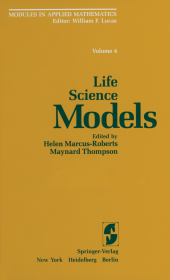 Neuerscheinungen 2011Stand: 2020-01-07 |
Schnellsuche
ISBN/Stichwort/Autor
|
Herderstraße 10
10625 Berlin
Tel.: 030 315 714 16
Fax 030 315 714 14
info@buchspektrum.de |

William F. Lucas, Helen Marcus-Roberts, Maynard Thompson
(Beteiligte)
Life Science Models
Herausgegeben von Marcus-Roberts, H.; Lucas, William F.; Thompson, Michael
2011. 366 S. 366p. 235 mm
Verlag/Jahr: SPRINGER, BERLIN 2011
ISBN: 1-461-25461-2 (1461254612)
Neue ISBN: 978-1-461-25461-4 (9781461254614)
Preis und Lieferzeit: Bitte klicken
The purpose of this four volume series is to make available for college teachers and students samples of important and realistic applications of mathematics which can be covered in undergraduate programs. The goal is to provide illustrations of how modern mathematics is actually employed to solve relevant contemporary problems. Although these independent chapters were prepared primarily for teachers in the general mathematical sciences, th~y should prove valuable to students, teachers, and research scientists in many of the fields of application as well. Prerequisites for each chapter and suggestions for the teacher are provided. Several of these chapters have been tested in a variety of classroom settings, and all have undergone extensive peer review and revision. Illustrations and exercises are included in most chapters. Some units can be covered in one class, whereas others provide sufficient material for a few weeks of class time. Volume 1 contains 23 chapters and deals with differential equations and, in the last four chapters, problems leading to partial differential equations. Applications are taken from medicine, biology, traffic systems and several other fields. The 14 chapters in Volume 2 are devoted mostly to problems arising in political science, but they also address questions appearing in sociology and ecology. Topics covered include voting systems, weighted voting, proportional representation, coalitional values, and committees. The 14 chapters in Volume 3 emphasize discrete mathematical methods such as those which arise in graph theory, combinatorics, and networks.


